The Jobs Killer: Ethical Theories and Driverless Trucks Analysis
VerifiedAdded on 2020/03/28
|6
|1951
|87
Essay
AI Summary
This essay, submitted by a student from the School of Computing and Maths at Charles Sturt University, explores the ethical implications of driverless trucks in Australia. The essay examines the potential impact of this technology on employment, the economy, and society, referencing a 2016 article discussing the issue. The student employs four key ethical theories—Utilitarianism, Deontology, Virtue Ethics, and Contract Theory—to analyze the ethical dimensions of driverless trucks. The essay concludes that, based on the application of these theories, the introduction of driverless trucks presents significant ethical challenges, particularly concerning job displacement and societal disruption. The analysis highlights the conflict between different ethical frameworks in evaluating this technological advancement, offering a comprehensive overview of the ethical dilemmas involved.
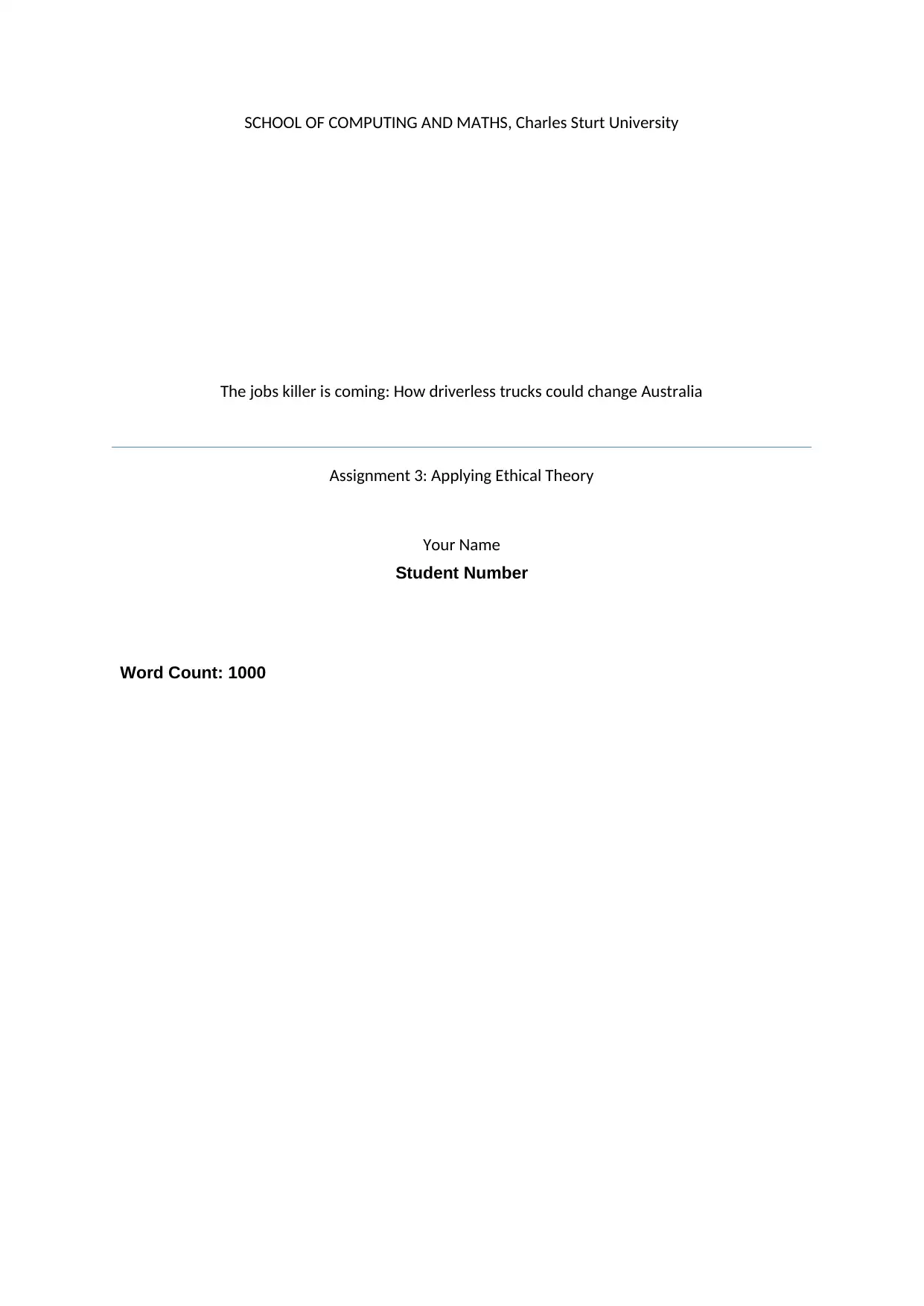
SCHOOL OF COMPUTING AND MATHS, Charles Sturt University
The jobs killer is coming: How driverless trucks could change Australia
Assignment 3: Applying Ethical Theory
Your Name
Student Number
Word Count: 1000
The jobs killer is coming: How driverless trucks could change Australia
Assignment 3: Applying Ethical Theory
Your Name
Student Number
Word Count: 1000
Paraphrase This Document
Need a fresh take? Get an instant paraphrase of this document with our AI Paraphraser
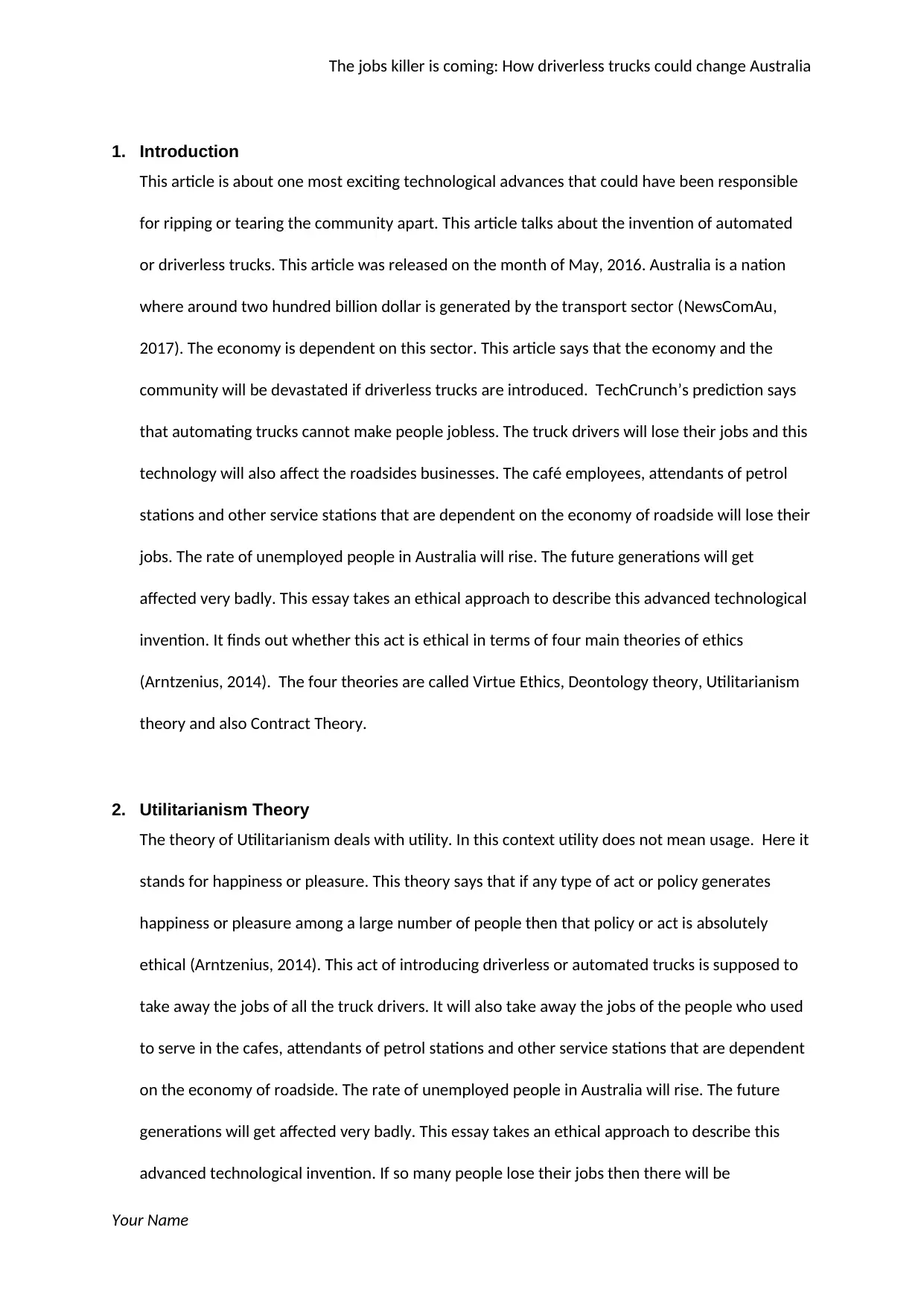
The jobs killer is coming: How driverless trucks could change Australia
1. Introduction
This article is about one most exciting technological advances that could have been responsible
for ripping or tearing the community apart. This article talks about the invention of automated
or driverless trucks. This article was released on the month of May, 2016. Australia is a nation
where around two hundred billion dollar is generated by the transport sector (NewsComAu,
2017). The economy is dependent on this sector. This article says that the economy and the
community will be devastated if driverless trucks are introduced. TechCrunch’s prediction says
that automating trucks cannot make people jobless. The truck drivers will lose their jobs and this
technology will also affect the roadsides businesses. The café employees, attendants of petrol
stations and other service stations that are dependent on the economy of roadside will lose their
jobs. The rate of unemployed people in Australia will rise. The future generations will get
affected very badly. This essay takes an ethical approach to describe this advanced technological
invention. It finds out whether this act is ethical in terms of four main theories of ethics
(Arntzenius, 2014). The four theories are called Virtue Ethics, Deontology theory, Utilitarianism
theory and also Contract Theory.
2. Utilitarianism Theory
The theory of Utilitarianism deals with utility. In this context utility does not mean usage. Here it
stands for happiness or pleasure. This theory says that if any type of act or policy generates
happiness or pleasure among a large number of people then that policy or act is absolutely
ethical (Arntzenius, 2014). This act of introducing driverless or automated trucks is supposed to
take away the jobs of all the truck drivers. It will also take away the jobs of the people who used
to serve in the cafes, attendants of petrol stations and other service stations that are dependent
on the economy of roadside. The rate of unemployed people in Australia will rise. The future
generations will get affected very badly. This essay takes an ethical approach to describe this
advanced technological invention. If so many people lose their jobs then there will be
Your Name
1. Introduction
This article is about one most exciting technological advances that could have been responsible
for ripping or tearing the community apart. This article talks about the invention of automated
or driverless trucks. This article was released on the month of May, 2016. Australia is a nation
where around two hundred billion dollar is generated by the transport sector (NewsComAu,
2017). The economy is dependent on this sector. This article says that the economy and the
community will be devastated if driverless trucks are introduced. TechCrunch’s prediction says
that automating trucks cannot make people jobless. The truck drivers will lose their jobs and this
technology will also affect the roadsides businesses. The café employees, attendants of petrol
stations and other service stations that are dependent on the economy of roadside will lose their
jobs. The rate of unemployed people in Australia will rise. The future generations will get
affected very badly. This essay takes an ethical approach to describe this advanced technological
invention. It finds out whether this act is ethical in terms of four main theories of ethics
(Arntzenius, 2014). The four theories are called Virtue Ethics, Deontology theory, Utilitarianism
theory and also Contract Theory.
2. Utilitarianism Theory
The theory of Utilitarianism deals with utility. In this context utility does not mean usage. Here it
stands for happiness or pleasure. This theory says that if any type of act or policy generates
happiness or pleasure among a large number of people then that policy or act is absolutely
ethical (Arntzenius, 2014). This act of introducing driverless or automated trucks is supposed to
take away the jobs of all the truck drivers. It will also take away the jobs of the people who used
to serve in the cafes, attendants of petrol stations and other service stations that are dependent
on the economy of roadside. The rate of unemployed people in Australia will rise. The future
generations will get affected very badly. This essay takes an ethical approach to describe this
advanced technological invention. If so many people lose their jobs then there will be
Your Name
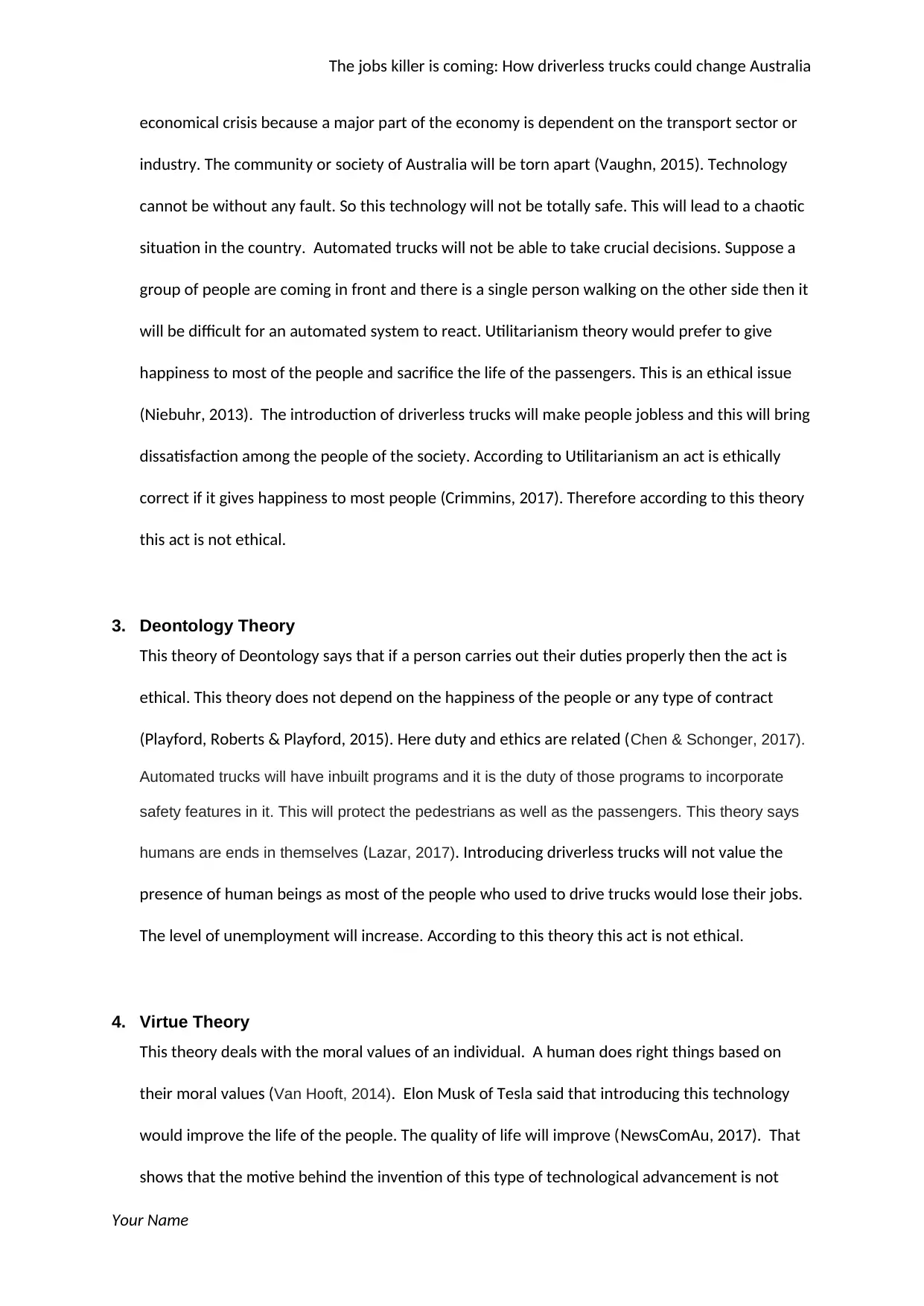
The jobs killer is coming: How driverless trucks could change Australia
economical crisis because a major part of the economy is dependent on the transport sector or
industry. The community or society of Australia will be torn apart (Vaughn, 2015). Technology
cannot be without any fault. So this technology will not be totally safe. This will lead to a chaotic
situation in the country. Automated trucks will not be able to take crucial decisions. Suppose a
group of people are coming in front and there is a single person walking on the other side then it
will be difficult for an automated system to react. Utilitarianism theory would prefer to give
happiness to most of the people and sacrifice the life of the passengers. This is an ethical issue
(Niebuhr, 2013). The introduction of driverless trucks will make people jobless and this will bring
dissatisfaction among the people of the society. According to Utilitarianism an act is ethically
correct if it gives happiness to most people (Crimmins, 2017). Therefore according to this theory
this act is not ethical.
3. Deontology Theory
This theory of Deontology says that if a person carries out their duties properly then the act is
ethical. This theory does not depend on the happiness of the people or any type of contract
(Playford, Roberts & Playford, 2015). Here duty and ethics are related (Chen & Schonger, 2017).
Automated trucks will have inbuilt programs and it is the duty of those programs to incorporate
safety features in it. This will protect the pedestrians as well as the passengers. This theory says
humans are ends in themselves (Lazar, 2017). Introducing driverless trucks will not value the
presence of human beings as most of the people who used to drive trucks would lose their jobs.
The level of unemployment will increase. According to this theory this act is not ethical.
4. Virtue Theory
This theory deals with the moral values of an individual. A human does right things based on
their moral values (Van Hooft, 2014). Elon Musk of Tesla said that introducing this technology
would improve the life of the people. The quality of life will improve (NewsComAu, 2017). That
shows that the motive behind the invention of this type of technological advancement is not
Your Name
economical crisis because a major part of the economy is dependent on the transport sector or
industry. The community or society of Australia will be torn apart (Vaughn, 2015). Technology
cannot be without any fault. So this technology will not be totally safe. This will lead to a chaotic
situation in the country. Automated trucks will not be able to take crucial decisions. Suppose a
group of people are coming in front and there is a single person walking on the other side then it
will be difficult for an automated system to react. Utilitarianism theory would prefer to give
happiness to most of the people and sacrifice the life of the passengers. This is an ethical issue
(Niebuhr, 2013). The introduction of driverless trucks will make people jobless and this will bring
dissatisfaction among the people of the society. According to Utilitarianism an act is ethically
correct if it gives happiness to most people (Crimmins, 2017). Therefore according to this theory
this act is not ethical.
3. Deontology Theory
This theory of Deontology says that if a person carries out their duties properly then the act is
ethical. This theory does not depend on the happiness of the people or any type of contract
(Playford, Roberts & Playford, 2015). Here duty and ethics are related (Chen & Schonger, 2017).
Automated trucks will have inbuilt programs and it is the duty of those programs to incorporate
safety features in it. This will protect the pedestrians as well as the passengers. This theory says
humans are ends in themselves (Lazar, 2017). Introducing driverless trucks will not value the
presence of human beings as most of the people who used to drive trucks would lose their jobs.
The level of unemployment will increase. According to this theory this act is not ethical.
4. Virtue Theory
This theory deals with the moral values of an individual. A human does right things based on
their moral values (Van Hooft, 2014). Elon Musk of Tesla said that introducing this technology
would improve the life of the people. The quality of life will improve (NewsComAu, 2017). That
shows that the motive behind the invention of this type of technological advancement is not
Your Name
⊘ This is a preview!⊘
Do you want full access?
Subscribe today to unlock all pages.

Trusted by 1+ million students worldwide
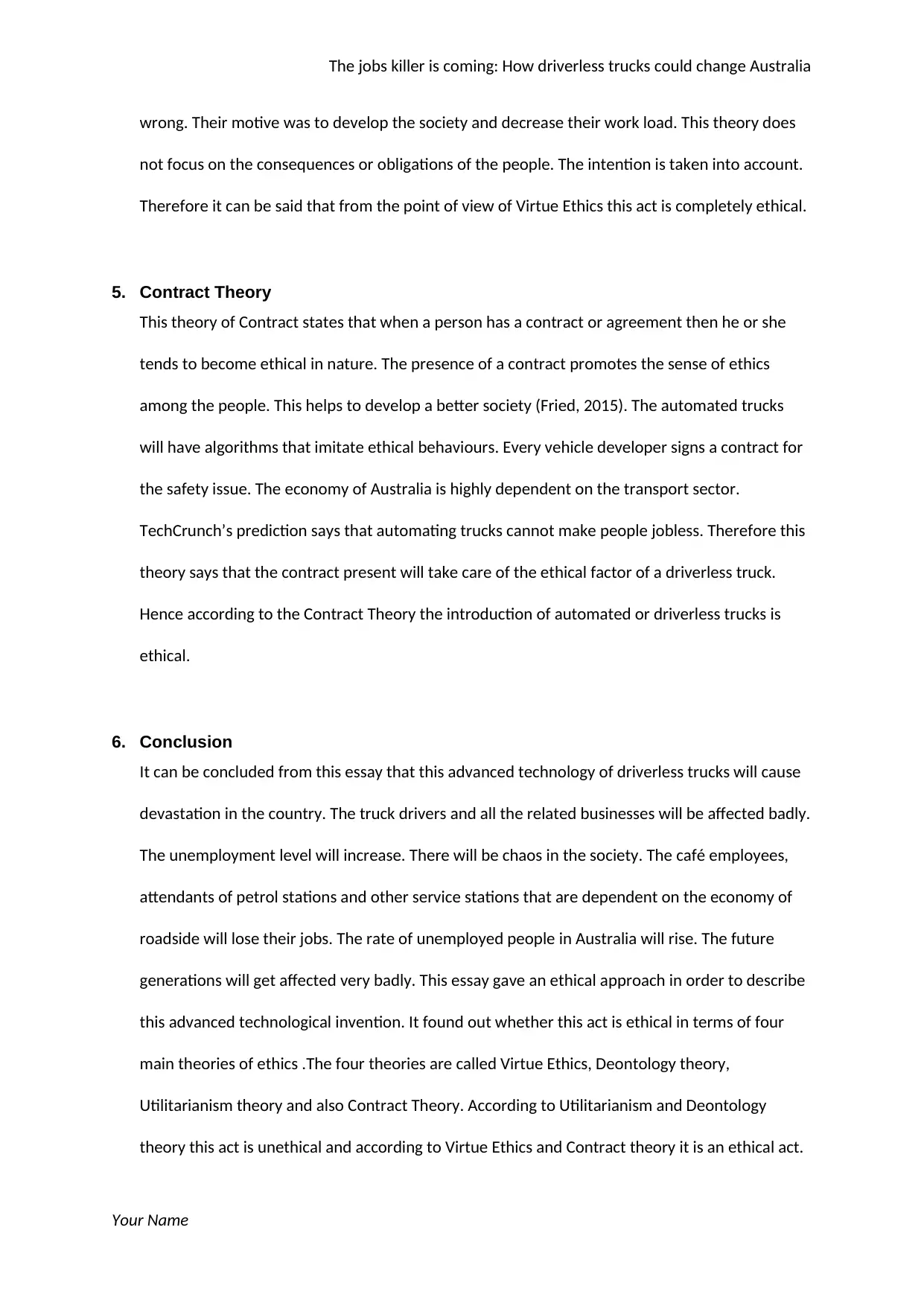
The jobs killer is coming: How driverless trucks could change Australia
wrong. Their motive was to develop the society and decrease their work load. This theory does
not focus on the consequences or obligations of the people. The intention is taken into account.
Therefore it can be said that from the point of view of Virtue Ethics this act is completely ethical.
5. Contract Theory
This theory of Contract states that when a person has a contract or agreement then he or she
tends to become ethical in nature. The presence of a contract promotes the sense of ethics
among the people. This helps to develop a better society (Fried, 2015). The automated trucks
will have algorithms that imitate ethical behaviours. Every vehicle developer signs a contract for
the safety issue. The economy of Australia is highly dependent on the transport sector.
TechCrunch’s prediction says that automating trucks cannot make people jobless. Therefore this
theory says that the contract present will take care of the ethical factor of a driverless truck.
Hence according to the Contract Theory the introduction of automated or driverless trucks is
ethical.
6. Conclusion
It can be concluded from this essay that this advanced technology of driverless trucks will cause
devastation in the country. The truck drivers and all the related businesses will be affected badly.
The unemployment level will increase. There will be chaos in the society. The café employees,
attendants of petrol stations and other service stations that are dependent on the economy of
roadside will lose their jobs. The rate of unemployed people in Australia will rise. The future
generations will get affected very badly. This essay gave an ethical approach in order to describe
this advanced technological invention. It found out whether this act is ethical in terms of four
main theories of ethics .The four theories are called Virtue Ethics, Deontology theory,
Utilitarianism theory and also Contract Theory. According to Utilitarianism and Deontology
theory this act is unethical and according to Virtue Ethics and Contract theory it is an ethical act.
Your Name
wrong. Their motive was to develop the society and decrease their work load. This theory does
not focus on the consequences or obligations of the people. The intention is taken into account.
Therefore it can be said that from the point of view of Virtue Ethics this act is completely ethical.
5. Contract Theory
This theory of Contract states that when a person has a contract or agreement then he or she
tends to become ethical in nature. The presence of a contract promotes the sense of ethics
among the people. This helps to develop a better society (Fried, 2015). The automated trucks
will have algorithms that imitate ethical behaviours. Every vehicle developer signs a contract for
the safety issue. The economy of Australia is highly dependent on the transport sector.
TechCrunch’s prediction says that automating trucks cannot make people jobless. Therefore this
theory says that the contract present will take care of the ethical factor of a driverless truck.
Hence according to the Contract Theory the introduction of automated or driverless trucks is
ethical.
6. Conclusion
It can be concluded from this essay that this advanced technology of driverless trucks will cause
devastation in the country. The truck drivers and all the related businesses will be affected badly.
The unemployment level will increase. There will be chaos in the society. The café employees,
attendants of petrol stations and other service stations that are dependent on the economy of
roadside will lose their jobs. The rate of unemployed people in Australia will rise. The future
generations will get affected very badly. This essay gave an ethical approach in order to describe
this advanced technological invention. It found out whether this act is ethical in terms of four
main theories of ethics .The four theories are called Virtue Ethics, Deontology theory,
Utilitarianism theory and also Contract Theory. According to Utilitarianism and Deontology
theory this act is unethical and according to Virtue Ethics and Contract theory it is an ethical act.
Your Name
Paraphrase This Document
Need a fresh take? Get an instant paraphrase of this document with our AI Paraphraser
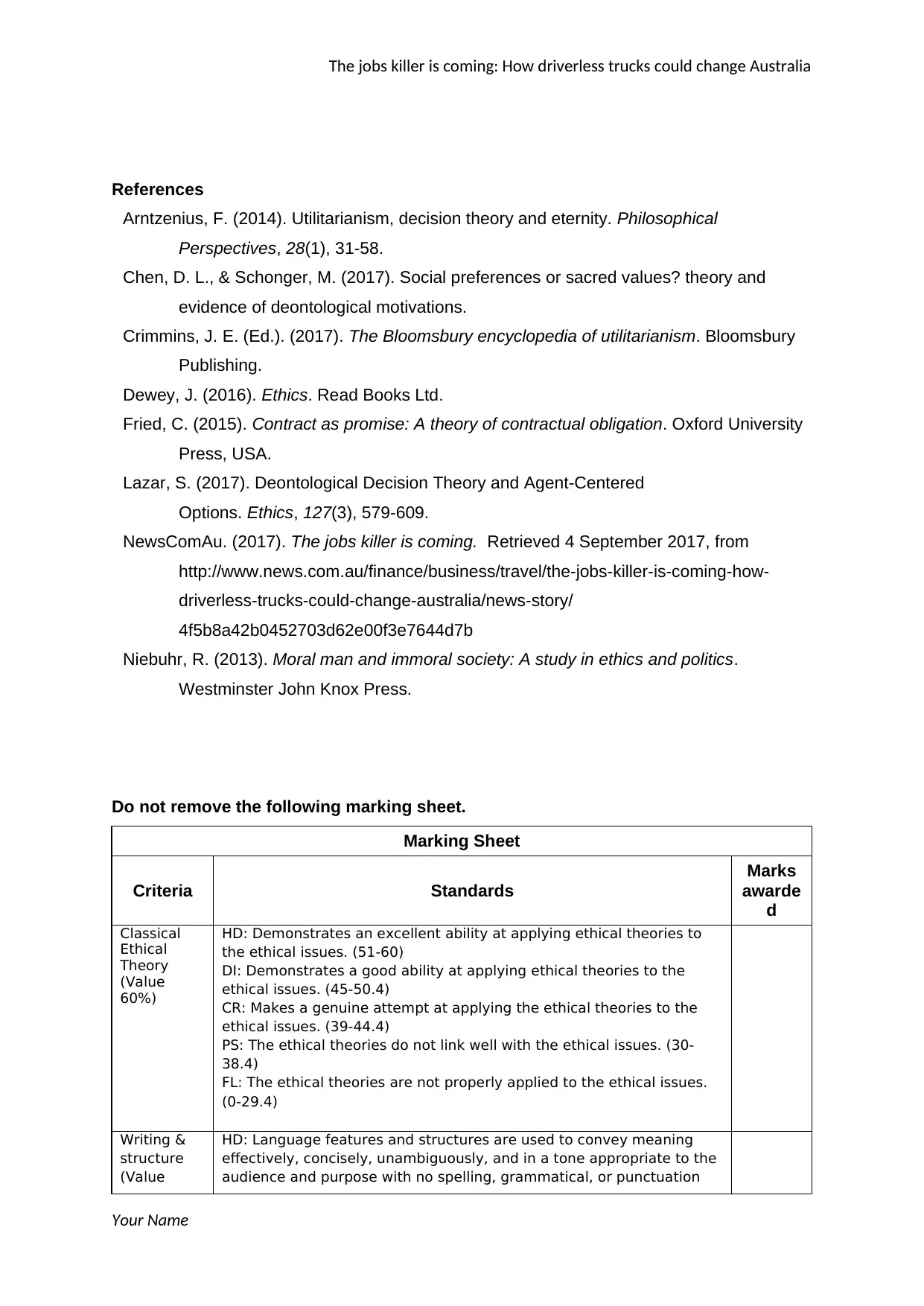
The jobs killer is coming: How driverless trucks could change Australia
References
Arntzenius, F. (2014). Utilitarianism, decision theory and eternity. Philosophical
Perspectives, 28(1), 31-58.
Chen, D. L., & Schonger, M. (2017). Social preferences or sacred values? theory and
evidence of deontological motivations.
Crimmins, J. E. (Ed.). (2017). The Bloomsbury encyclopedia of utilitarianism. Bloomsbury
Publishing.
Dewey, J. (2016). Ethics. Read Books Ltd.
Fried, C. (2015). Contract as promise: A theory of contractual obligation. Oxford University
Press, USA.
Lazar, S. (2017). Deontological Decision Theory and Agent-Centered
Options. Ethics, 127(3), 579-609.
NewsComAu. (2017). The jobs killer is coming. Retrieved 4 September 2017, from
http://www.news.com.au/finance/business/travel/the-jobs-killer-is-coming-how-
driverless-trucks-could-change-australia/news-story/
4f5b8a42b0452703d62e00f3e7644d7b
Niebuhr, R. (2013). Moral man and immoral society: A study in ethics and politics.
Westminster John Knox Press.
Do not remove the following marking sheet.
Marking Sheet
Criteria Standards
Marks
awarde
d
Classical
Ethical
Theory
(Value
60%)
HD: Demonstrates an excellent ability at applying ethical theories to
the ethical issues. (51-60)
DI: Demonstrates a good ability at applying ethical theories to the
ethical issues. (45-50.4)
CR: Makes a genuine attempt at applying the ethical theories to the
ethical issues. (39-44.4)
PS: The ethical theories do not link well with the ethical issues. (30-
38.4)
FL: The ethical theories are not properly applied to the ethical issues.
(0-29.4)
Writing &
structure
(Value
HD: Language features and structures are used to convey meaning
effectively, concisely, unambiguously, and in a tone appropriate to the
audience and purpose with no spelling, grammatical, or punctuation
Your Name
References
Arntzenius, F. (2014). Utilitarianism, decision theory and eternity. Philosophical
Perspectives, 28(1), 31-58.
Chen, D. L., & Schonger, M. (2017). Social preferences or sacred values? theory and
evidence of deontological motivations.
Crimmins, J. E. (Ed.). (2017). The Bloomsbury encyclopedia of utilitarianism. Bloomsbury
Publishing.
Dewey, J. (2016). Ethics. Read Books Ltd.
Fried, C. (2015). Contract as promise: A theory of contractual obligation. Oxford University
Press, USA.
Lazar, S. (2017). Deontological Decision Theory and Agent-Centered
Options. Ethics, 127(3), 579-609.
NewsComAu. (2017). The jobs killer is coming. Retrieved 4 September 2017, from
http://www.news.com.au/finance/business/travel/the-jobs-killer-is-coming-how-
driverless-trucks-could-change-australia/news-story/
4f5b8a42b0452703d62e00f3e7644d7b
Niebuhr, R. (2013). Moral man and immoral society: A study in ethics and politics.
Westminster John Knox Press.
Do not remove the following marking sheet.
Marking Sheet
Criteria Standards
Marks
awarde
d
Classical
Ethical
Theory
(Value
60%)
HD: Demonstrates an excellent ability at applying ethical theories to
the ethical issues. (51-60)
DI: Demonstrates a good ability at applying ethical theories to the
ethical issues. (45-50.4)
CR: Makes a genuine attempt at applying the ethical theories to the
ethical issues. (39-44.4)
PS: The ethical theories do not link well with the ethical issues. (30-
38.4)
FL: The ethical theories are not properly applied to the ethical issues.
(0-29.4)
Writing &
structure
(Value
HD: Language features and structures are used to convey meaning
effectively, concisely, unambiguously, and in a tone appropriate to the
audience and purpose with no spelling, grammatical, or punctuation
Your Name
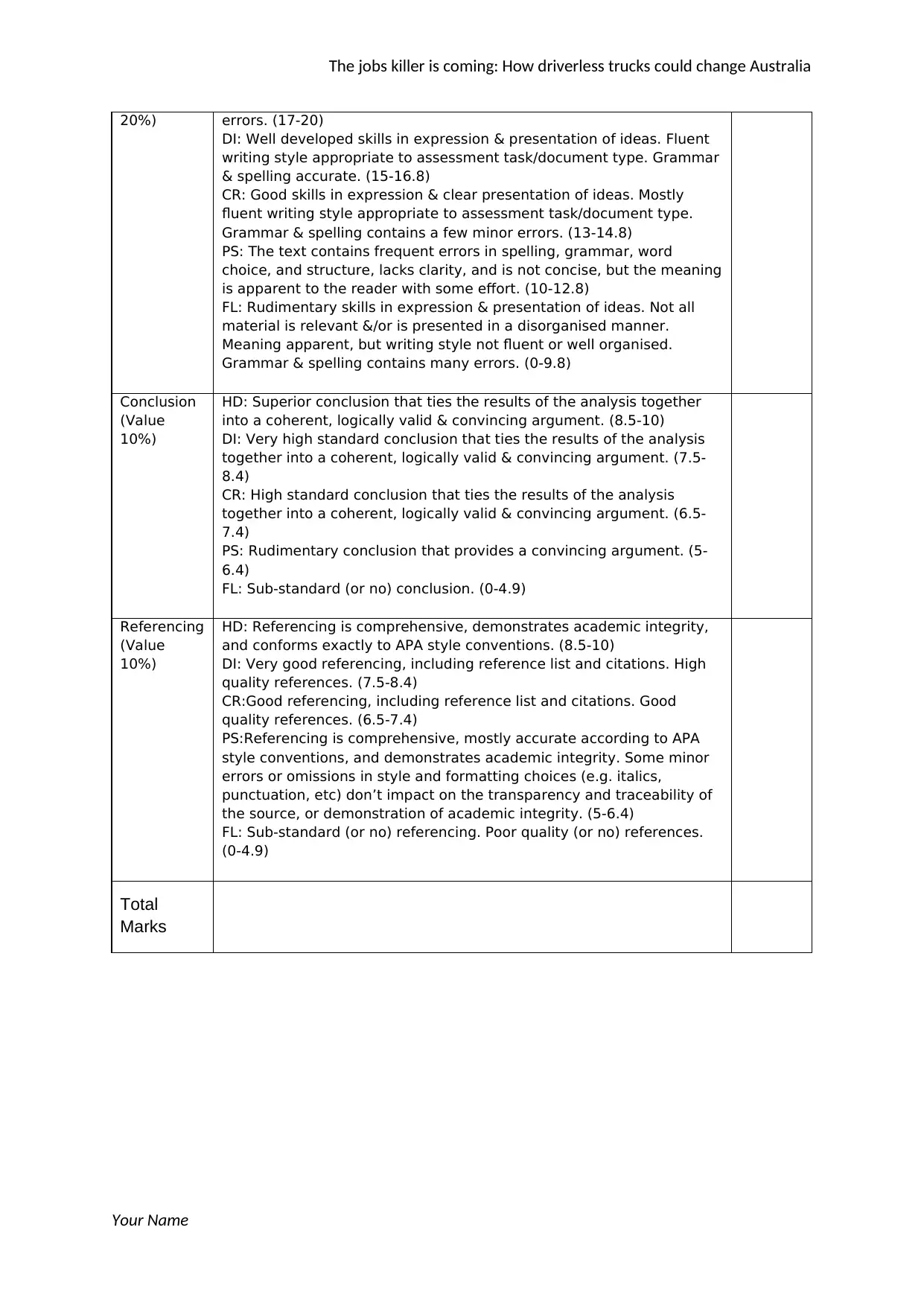
The jobs killer is coming: How driverless trucks could change Australia
20%) errors. (17-20)
DI: Well developed skills in expression & presentation of ideas. Fluent
writing style appropriate to assessment task/document type. Grammar
& spelling accurate. (15-16.8)
CR: Good skills in expression & clear presentation of ideas. Mostly
fluent writing style appropriate to assessment task/document type.
Grammar & spelling contains a few minor errors. (13-14.8)
PS: The text contains frequent errors in spelling, grammar, word
choice, and structure, lacks clarity, and is not concise, but the meaning
is apparent to the reader with some effort. (10-12.8)
FL: Rudimentary skills in expression & presentation of ideas. Not all
material is relevant &/or is presented in a disorganised manner.
Meaning apparent, but writing style not fluent or well organised.
Grammar & spelling contains many errors. (0-9.8)
Conclusion
(Value
10%)
HD: Superior conclusion that ties the results of the analysis together
into a coherent, logically valid & convincing argument. (8.5-10)
DI: Very high standard conclusion that ties the results of the analysis
together into a coherent, logically valid & convincing argument. (7.5-
8.4)
CR: High standard conclusion that ties the results of the analysis
together into a coherent, logically valid & convincing argument. (6.5-
7.4)
PS: Rudimentary conclusion that provides a convincing argument. (5-
6.4)
FL: Sub-standard (or no) conclusion. (0-4.9)
Referencing
(Value
10%)
HD: Referencing is comprehensive, demonstrates academic integrity,
and conforms exactly to APA style conventions. (8.5-10)
DI: Very good referencing, including reference list and citations. High
quality references. (7.5-8.4)
CR:Good referencing, including reference list and citations. Good
quality references. (6.5-7.4)
PS:Referencing is comprehensive, mostly accurate according to APA
style conventions, and demonstrates academic integrity. Some minor
errors or omissions in style and formatting choices (e.g. italics,
punctuation, etc) don’t impact on the transparency and traceability of
the source, or demonstration of academic integrity. (5-6.4)
FL: Sub-standard (or no) referencing. Poor quality (or no) references.
(0-4.9)
Total
Marks
Your Name
20%) errors. (17-20)
DI: Well developed skills in expression & presentation of ideas. Fluent
writing style appropriate to assessment task/document type. Grammar
& spelling accurate. (15-16.8)
CR: Good skills in expression & clear presentation of ideas. Mostly
fluent writing style appropriate to assessment task/document type.
Grammar & spelling contains a few minor errors. (13-14.8)
PS: The text contains frequent errors in spelling, grammar, word
choice, and structure, lacks clarity, and is not concise, but the meaning
is apparent to the reader with some effort. (10-12.8)
FL: Rudimentary skills in expression & presentation of ideas. Not all
material is relevant &/or is presented in a disorganised manner.
Meaning apparent, but writing style not fluent or well organised.
Grammar & spelling contains many errors. (0-9.8)
Conclusion
(Value
10%)
HD: Superior conclusion that ties the results of the analysis together
into a coherent, logically valid & convincing argument. (8.5-10)
DI: Very high standard conclusion that ties the results of the analysis
together into a coherent, logically valid & convincing argument. (7.5-
8.4)
CR: High standard conclusion that ties the results of the analysis
together into a coherent, logically valid & convincing argument. (6.5-
7.4)
PS: Rudimentary conclusion that provides a convincing argument. (5-
6.4)
FL: Sub-standard (or no) conclusion. (0-4.9)
Referencing
(Value
10%)
HD: Referencing is comprehensive, demonstrates academic integrity,
and conforms exactly to APA style conventions. (8.5-10)
DI: Very good referencing, including reference list and citations. High
quality references. (7.5-8.4)
CR:Good referencing, including reference list and citations. Good
quality references. (6.5-7.4)
PS:Referencing is comprehensive, mostly accurate according to APA
style conventions, and demonstrates academic integrity. Some minor
errors or omissions in style and formatting choices (e.g. italics,
punctuation, etc) don’t impact on the transparency and traceability of
the source, or demonstration of academic integrity. (5-6.4)
FL: Sub-standard (or no) referencing. Poor quality (or no) references.
(0-4.9)
Total
Marks
Your Name
⊘ This is a preview!⊘
Do you want full access?
Subscribe today to unlock all pages.

Trusted by 1+ million students worldwide
1 out of 6
Related Documents
Your All-in-One AI-Powered Toolkit for Academic Success.
+13062052269
info@desklib.com
Available 24*7 on WhatsApp / Email
![[object Object]](/_next/static/media/star-bottom.7253800d.svg)
Unlock your academic potential
Copyright © 2020–2026 A2Z Services. All Rights Reserved. Developed and managed by ZUCOL.





